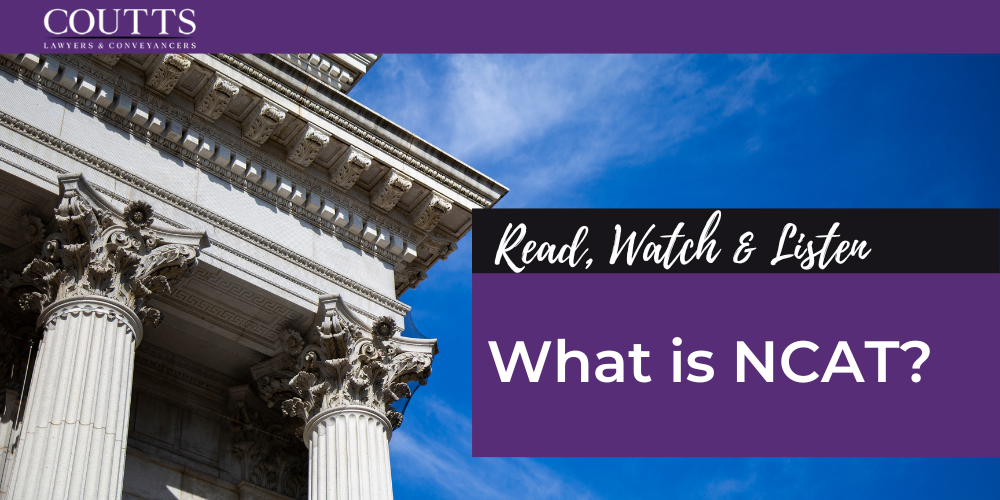KEY TAKE-OUTS:
- The NSW Civil and Administrative Tribunal (“NCAT”) hears a range of civil and administrative cases in New South Wales. It is similar to a court, however, is considered less formal.
- Generally, individuals represent themselves in NCAT, but requests can be made for legal representation in certain circumstances.
- NCAT is a no costs jurisdiction. However, NCAT may award costs to a successful party if it is satisfied that there are special circumstances that warrant such an award.
- Local and District Courts can hear NCAT matters if they fall into the Federal Jurisdiction
What is the role of NCAT?
NCAT was established as a cheaper, faster, and less formal forum for the determination of civil disputes. The creation of NCAT was designed to alleviate pressure from the court system and allow the general public to seek justice themselves.
What types of matters does the NCAT handle?
Since its commencement on 1 January 2014, the Tribunal has dealt with a broad and diverse range of matters. Due to the diverse jurisdiction and case types, there are four Divisions of NCAT and an Appeal Panel.
- Administrative & Equal Opportunity Division – dealing with administrative decisions made by government agencies and anti-discrimination matters.
- Consumer & Commercial Division – resolves a wide range of disputes including, but not limited to, building disputes and tenancy disputes.
- Guardianship Division – dealing with applications concerning decision-making of those who may need a legally appointed decision-maker.
- Occupational Division – reviewing decisions made by government agencies about licencing and complaints concerning professional conduct and discipline.
- Appeal Panel – Hears internal appeals from decisions made by NCAT’s division
NCAT Applications
When commencing proceedings in NCAT, an application form must be submitted. There are time limits to make certain claims in the Tribunal or appeal certain decisions. Accordingly, it is important to be aware of any time limits which may apply.
All NCAT application forms are available for download in PDF from the Tribunal’s website. Some matters can also be applied for online through the NCAT portal. Application fees may be payable depending on the claim type.
Do you need a lawyer for NCAT hearings?
NCAT is established to be accessible to the general public with the aim of resolving claims justly, quickly, cheaply and with as little formality as possible.
Most people choose to represent themselves at NCAT however, legal representation may be requested.
A request for representation can be made in writing at any stage during the proceedings or in person at the hearing and will only be granted in certain circumstances. Requests for representation can also include representation by real estate agents, strata managing agents, an advocate, friend or relative with authority to act on your behalf. If the tribunal denies the request for leave, your representative can still provide assistance on an informal basis as a support person or assist you to prepare for your case prior to the hearing.
At Coutts we understand that we may not be able to appear in NCAT on your behalf, however, we are able to assist you in preparing and advising on the relevant documents and statements to adequately prepare you for your hearing.
Can you claim legal costs in NCAT?
It is not common for NCAT to make cost orders following the outcome of a hearing, meaning the unsuccessful party must pay the legal fees of the successful party. However, in limited circumstances, under section 60 of the Civil and Administrative Tribunal Act 2013 (NSW), NCAT may award costs if it is satisfied that there are special circumstances that warrant this.
If you commence NCAT proceedings and are considering engaging a lawyer to assist you with your claim, Coutts can provide you with advice as to whether your specific matter would give rise to the special circumstances in the Civil and Administrative Tribunal Act 2013 (NSW).
NCAT jurisdictional limits
Under the Commonwealth Constitution, NCAT has no jurisdiction to hear a dispute where federal jurisdiction is enlivened.
There are multiple situations where federal jurisdiction can arise, for example, if at the time of lodging an application, one party is a permanent resident of NSW and the opposing party is a resident of a different state, NCAT will not be able to hear the matter as the parties do not both reside in NSW. In this regard, it is important for the parties to obtain legal advice as to the appropriate next steps.
At Coutts, our commercial litigation team has ample experience in advising clients on their potential NCAT claims and defending existing NCAT claims. In instances where legal representation may not be granted, Coutts can empower our clients by assisting them to prepare for their matter, advising them so they are fully informed and understand the process and procedure of the Tribunal and giving them the confidence to appear and advocate for themselves.
For further information please don’t hesitate to contact Sydney Lawyers
This blog is merely general and non-specific information on the subject matter and is not and should not be considered or relied on as legal advice. Coutts is not responsible for any cost, expense, loss or liability whatsoever to this blog, including all or any reliance on this blog or use or application of this blog by you.



